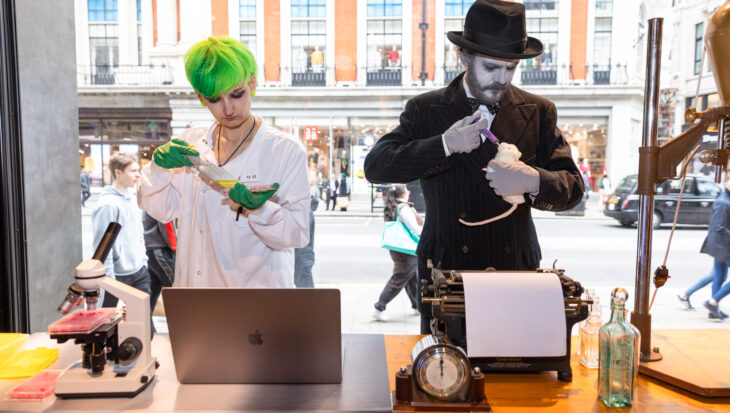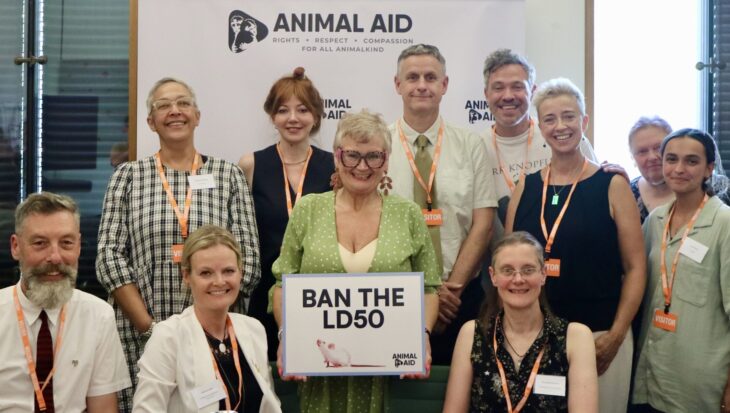The report, including evidence gathered from witnesses over the past 17 months, is available online at www.publications.parliament.uk/pa/ld200102/ldselect/ldanimal/150/150.pdf
The committee recommends that more information on “what animal experiments are done and why” should be made public, as well as urging the government to repeal the notorious section 24 “secrecy clause” of the Animals (Scientific Procedures) Act 1986. Animal Aid very much welcomes these recommendations because access to information on proposed experiments before they are conducted would enable them to be scrutinised for validity and necessity. We are confident they will be found wanting! Non-animal methods to achieve the same aims could then be proposed. We fear it is likely, however, that the proposed new Freedom of Information legislation will have its own loopholes, which will allow much secrecy to continue.
The report also calls for a “streamlining of the licensing process” – something which all of the pro-vivisection witnesses requested, to help them maintain international competitiveness. Animal Aid detects a worrying ring to this “fast-track” proposal, which has been engineered by the Pharmaceutical Industry Competitiveness Task Force. It is uncannily reminiscent of the blackmailing letter written to Lord Sainsbury by pro-vivisectionists in June 2000 demanding cuts in red tape or the economy will suffer! It is difficult to see how animal welfare will not be compromised by measures designed to make it easier to obtain licences to experiment on animals.
The committee also said more should be done to fund and promote “alternative” methods, i.e. Reduction, Refinement and Replacement. Animal Aid welcomes this recommendation because progress in the validation, acceptance and use of non-animal methods – even though they are superior – is painfully slow. Current government funding is derisory (approx. £60,000/year) so even modest investment could make significant improvements.
However, Animal Aid is extremely disappointed that the Lords completely failed to question the fundamental issue of whether animal experiments are actually scientifically valid. Several witnesses, including Animal Aid (in writing – we asked if we could give oral evidence but were refused) gave evidence to the committee to show that animal experiments are seriously scientifically flawed. Yet the committee chose to ignore this evidence in favour of the many witnesses from the animal experimentation community who claim the practice is valid – even though none of them was ever able to produce a shred of independent scientific evidence to support their claim. The best they could do was a study claiming up to 71 % concordance of pharmaceutical side-effects between people and animals – specifically stating that no other methods can do better! Yet a ten-year international evaluation of in vitro toxicology demonstrated a much better accuracy for predicting human hazard – up to 86%. Clearly, this still needs improvement, but a 14% margin of error is a lot better than 29%! The 71% study is seriously flawed, not least because the research was funded by the pharmaceutical industry, but also because 71% does not represent the rate of prediction attained by animal experiments – to claim that it does displays an alarming lack of understanding of the problem. The study was retrospective, NOT predictive, nor did it include false positives or true negatives. It does not mean that animals predict side-effects for people 71% of the time. In fact, a study in 1990 showed that animals did not predict 67% of pharmaceutical toxicities that ocurred in people. (CMR workshop, Animal Toxicity Studies: Their Relevance for Man, p49-56. Quay, 1990). Another showed that animals predicted side-effects only 6 in 114 times! (p57-67).
The main point here, which the committee has failed to grasp, is that the 3Rs is a smokescreen for the industry. Of course reducing and refining the use of animals is good – from an animal welfare point of view – but if animal experiments do not work (which we, in good company, contend that they don’t) then there is little point doing anything other than abolishing them. Animal experiments have never been validated and if they were to be rigorously assessed for validity, as non-animal methods are, they would undoubtedly fail.
It is frustratingly clear that the committee’s mind was made up from the start. The chairman, Lord Smith, went on record months ago in support of animal experiments, before most witnesses had even given evidence to the committee. Animal Aid is optimistic that some good may result from this exercise, but disappointed that an opportunity to ask fundamental questions about whether animal experiments are still a valid scientific method in the 21st century has been squandered.

